Portugal continues to consume in excess, with the resources of 2,88 planets being needed to meet the consumption of the Portuguese, an increase compared to the Living Planet Report from WWF International published in 2020 (2,52 planets in the last report).
The abundance of wildlife has dropped by an average of 69% since 1970, according to the WWF's Living Planet Report (RPV) 2022, which monitored mammals, birds, amphibians, reptiles and fish. The report warns of the serious state of nature and points to the urgency of implementing transformative actions by governments, companies and citizens, in order to reverse the destruction of biodiversity.
Presenting the largest dataset worked to date, with almost 32.000 populations of 5.230 species being monitored, the Living Planet Index (IPV), provided in the Zoological Society of London (ZSL), shows that it is in tropical regions that monitored vertebrate populations are falling at an astonishing rate.
The environmental non-governmental organization WWF says that it is therefore «extremely concerned about this trend, since several of these geographic areas are among the most biodiverse in the world». In particular, IPV data reveal that between 1970 and 2018, monitored wildlife populations in the Latin American and Caribbean region fell by an average of 94%.
In less than a human lifetime, monitored freshwater populations dropped an average of 83%, the biggest decline of any species group. Habitat loss and barriers to migration routes (notably dams and other river barriers) account for about half of the threats to migratory fish species monitored.
For Marco Lambertini, Director General of WWF International, “we face two emergencies: climate change caused by humans and the loss of biodiversity, which threaten the well-being of current and future generations. We are deeply concerned about this new data, which shows a devastating drop in wildlife populations, particularly in tropical regions that are among the most biodiverse landscapes in the world.”
Portugal has a relevant share of responsibility for the global decline in shark and ray populations. The abundance of these species has decreased by 71% over the last 50 years, with Portugal being the 2nd country in the world with the largest known exports of shark meat and the 6th largest importer of ray meat in terms of volume.
Implementing measures for the protection of sharks and rays in Portugal would thus have the power to impact the entire global commercial network in the path of protecting these species, which justifies the creation of a National Action Plan for the Management and Conservation of Sharks and rays.

“Wildlife continues to decline at an alarming rate, which has serious consequences for our own health and livelihoods, and Portugal is not exempt from responsibility. We appeal to the Government and companies of our country not to ignore the urgent signals sent by our planet, because it is on which all humanity depends", says Ângela Morgado, executive director of ANP|WWF, adding that "current trends indicate that this dual emergence of climate change and biodiversity loss can be reversed – but we need to accelerate transformational change with assertive policies and actions. The decline in biodiversity is also felt in Portugal and affects us all”.
In December, world leaders will meet at the 15th «Conference of the Parties (COP15) of the Convention on Biological Diversity and will have a unique opportunity to reverse this reality, for the good of people and the planet.
WWF advocates that leaders must commit to a “Paris-style” agreement, capable of reversing the loss of biodiversity, to ensure a positive world for nature by 2030.
“At COP15, leaders have the opportunity to redefine our relationship with nature and ensure a healthier and more sustainable future for all, by signing a biodiversity agreement that is global, ambitious and positive for nature,” said Marco Lambertini.
“Given this growing crisis of nature, it is essential that this agreement guarantees immediate actions on the ground, including through a transformation of the sectors that drive the loss of nature and financial support to emerging countries”.
The escalation of global crises such as climate change, the loss of biodiversity and the increase in hunger have increased the urgency of transforming food systems. The way we produce our food is putting our planet at risk.
Therefore, and in parallel with the RPV, WWF is also launching today “The Great Food Puzzle”, where 20 levers for the transformation of food systems are identified. This is a starting point for governments to take action at the national level on food production, consumption, loss and waste. There is an urgent need to accelerate the transition to sustainable food systems through national-level policies that are integrated with climate and biodiversity targets. Promoting a sustainable diet is absolutely essential.
The data reinforce that the main drivers of wildlife population decline worldwide are habitat degradation and loss, exploitation, introduction of invasive species, pollution, climate change and disease. Several of these factors played a role in the 66% drop in wildlife populations in Africa during this period, as well as the 55% overall drop in Asia-Pacific.
On the path to reversing this decline, securing a positive future for nature will not be possible without recognizing and respecting the rights, governance and conservation leadership of indigenous peoples and local communities around the world.
Click here to view the full report.

WWF – Living Planet Report 2022
The Living Planet Report (RPV) is the most emblematic publication of the WWF network. Published every two years, it is a comprehensive study of trends in global biodiversity and the health of the planet.
The Living Planet Report 2022 is the 14th edition of this report and, by analyzing data from 32.000 populations of wildlife species between 1970 and 2018, brings us the scientific evidence to support what nature itself has repeatedly demonstrated: unsustainable human activity is pushing the planet's natural systems that support life on Earth to their limits.
The abundance of global populations of fish, birds, mammals, amphibians and reptiles has declined by an average of 69% in a human lifetime.
With regard to sharks and rays, which are among the groups with the most species at risk of extinction on the planet (37%), and for those that inhabit the high seas, the global abundance has decreased by 71% over the last 50 years, due to the increased fishing effort.
Portugal has a relevant share of responsibility for the decline in shark and ray populations: it is the 3rd country in Europe with the largest catches of sharks and rays, the 2nd country in the world with the largest known exports of beef meat. shark and the 6th largest importer of ray meat in terms of volume. The elaboration and implementation of a National Action Plan for the Management and Conservation of Sharks and Rays would place Portugal at the forefront of European countries that safeguard the protection of their species and the ocean.
Furthermore, given Portugal's role as an important commercial bridge, the protection measures it implements in its territory have the potential to impact the entire global commercial network of shark and ray-based products.
The main threats to species are directly linked to human activities, with food production being the most important. The evidence is unequivocal – we live in a dual crisis of biodiversity loss and climate change. Scientists are clear: unless we stop treating these emergencies as two separate issues, and stop ignoring them, no problem will be addressed effectively. The ANP|WWF advocates a target for nature similar to the 2016 Paris Agreement target of net zero emissions by 2050.
It is urgent to restore nature, not just stop its loss. We need more nature by 2030 to ensure the now recognized human right to a clean, healthy and sustainable environment.

Climate change and the loss of biodiversity are not just environmental issues. These are economic, developmental, security, social, moral and ethical issues. Industrialized countries are responsible for most of the environmental degradation, but it is the economically emerging nations that are disproportionately impacted by the loss of biodiversity. We all have a role to play in building a nature-positive society that protects the planet for everyone's good health.
RPV 2022 / Portugal
The Portuguese currently need 2,88 planets to maintain their current lifestyle, according to data from the WWF Living Planet Report (RPV), 2022 edition, representing an increase compared to the previous report (2020 – 2,52 planets) .

The 2022 report presents the Ecological Footprint in 2018, in a period of growth in the national economy accompanied by a high growth in tourism, which amounts to 4,6 gha/person.
This represents an increase compared to the RPV of 2020, where data for 2016 were analyzed, already emerging from the economic crisis, and in which the ecological footprint was 4,1 gha/person. Despite this increase in the Ecological Footprint per capita in Portugal, our country remains in the 46th place worldwide in this report, while in the 2018 RPV it appeared in the 66th position.
The economic recovery implied a significant increase in consumption by the Portuguese and tourists looking for Portugal as a destination, but did not change their position relative to other countries.
The country that occupies the first place in this Footprint scale is Qatar (being the one with the worst environmental performance). Countries such as the United States, Australia, Canada, France, Italy, the United Kingdom, the Netherlands, Belgium, Switzerland and Germany have larger Footprints than Portugal.
The World, European and Portuguese Ecological Footprints are presented in Table 1.

Components of the Portuguese Ecological Footprint
Figure 3 compares the Ecological Footprint for Portugal, in its various components, with Biocapacity from 1961 to 2018. Between 1994 and 2009, the Ecological Footprint of the Portuguese was always very high, compared to the country's Biocapacity, which has remained more or less constant since 1961. After 2009, and as mentioned, the Footprint fell as a result of the reduction in consumption by the Portuguese during the period of the global financial crisis and the national debt crisis that culminated in the “troika” readjustment program in Portugal.
Carbon, which represents 56% of the Portuguese Ecological Footprint, was the component that declined the most, influencing the total national values. For example, in 2004, carbon corresponded to 63% of the total value. This trend is naturally associated with consumption, which declined during the economic crisis, but also with the change in national energy production sources, as it was at the beginning of the millennium that Portugal began to invest heavily in renewable energies.
Also comparing with 2004, in the pre-crisis period, it is observed that almost all components show a drop, with the exception, although not very significant, of construction zones (a sector that usually only slows down in times of crisis) and pastures. .
After 2014, there is an inflection of the curve, with an absolute increase in all components of the Portuguese footprint, with the exception of the agricultural area and pastures (in a slight inversion compared to the 10 previous years), which may be associated with rural abandonment that has been observed in the interior of the country and changes in land use.
The component with the highest relative growth is that of forest products, with an increase of 92% between 2014 and 2016 associated with the recovery in construction and consequently in furniture, in addition to other investments in the national capacity to process those products.

Urgent and positive action for nature
Today we face the dual emergence of climate change and the loss of biodiversity, threatening the well-being of current and future generations.
Current trends indicate that these crises can be stopped and reversed – but we need to accelerate transformational changes. These are the main messages of the Living Planet Report:
Protect and finance 30% of our sea, land and rivers. Portugal has a significant area of its territory under protection, but still below the 30% it has already committed to.
To improve the protection of our nature, we need not only targets based on scientific evidence, but also adequate funding to implement them, through processes that are transparent, predictable, participatory and based on the best available knowledge.
Only in this way will we be able to protect our biodiversity to face climate change.
Restore the health of our rivers. Our rivers are threatened by pollution, overuse of water and barriers that prevent their free flow.
We need to reduce the environmental impacts of activities that affect our rivers, restore rivers and their connectivity, and stop the construction of unnecessary new dams.
Consume protein responsibly. Our protein sources have a significant environmental impact, with the impact usually being more associated with the way they are produced – not the way they are transported.
We must reduce the amount of protein we eat and ensure that it is of better quality: whether it comes from meat produced extensively in the cork oak forests, from responsibly caught fish, or from legumes that are not processed and produced responsibly.
Prioritize the consumption of plant-based proteins and, to consume animal protein, that is of quality and produced in a responsible way. Above all, it is essential to diversify the diet: it is good for human health and for the health of the planet.
Choosing forest-based products from forests whose management is certified by a credible scheme such as the FSC®: in Portugal, 546 thousand ha are certified.
We recommend looking for wood, furniture, paper or cork products with the FSC® logo.
Protect sharks and rays. These fish are critical to the health of our ocean, on which we all depend. However, they are searched for their meat, fins, cartilage, skeleton and other parts, endangering these true Guardians of the Oceans. We urge you to refuse these fish in the diet, avoiding eating, for example, dyke, dogfish, red foot and ray.
Together, we say: #TubarãoNoPratoNão and #TireARaiaDestaAlhada.
Halt deep sea mining. Although it has not yet started on a commercial scale, this large-scale activity has unknown and potentially high-magnitude impacts on the seabed of the great and still unknown deep sea. We defend a moratorium on deep sea mining, both in national and international waters, and call for the signature of the petition addressed to the Portuguese Government.
Give young people a voice. The main concerns of young people include the climate crisis and the loss of biodiversity. Through their decision-making power, more and more young people are changing their diet to make it healthier and more sustainable.
But everyone can help make the change by going beyond your plate.
A Generation Earth Portugal trains young people aged between 16 and 25 to develop environmental leadership skills, so that they can contribute to a future in which people live in harmony with nature.




















Comments